|
2 Bench Street
Dover
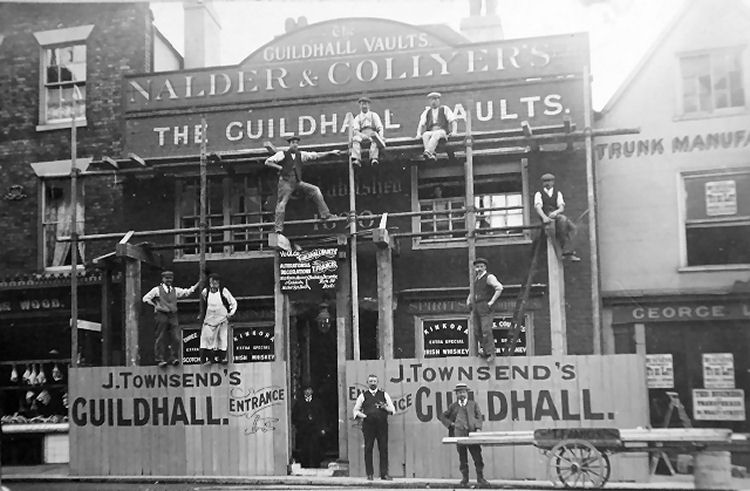
Above picture kindly sent by James Linden Ferrissey, who says the
picture has been in his family album since 1928 sent by Albert Edward
Potter who must have worked for the company. Click here. |
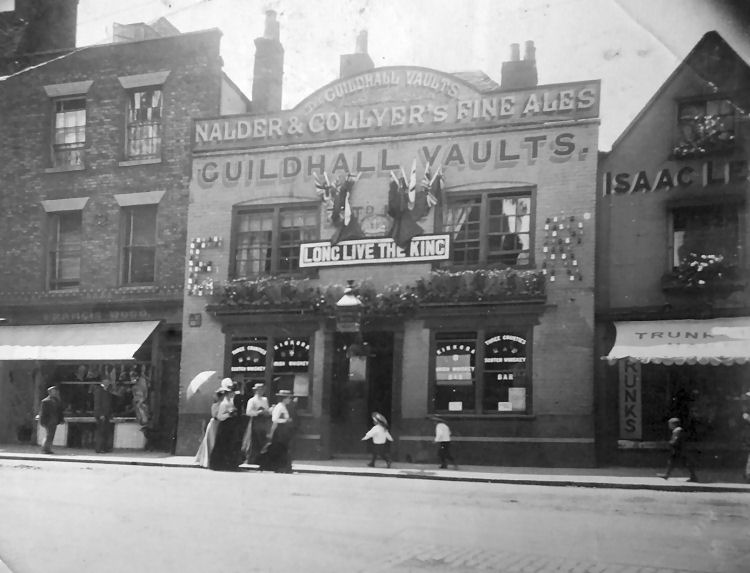
Above photo, circa 1911, kindly sent by Graham Butterworth. |
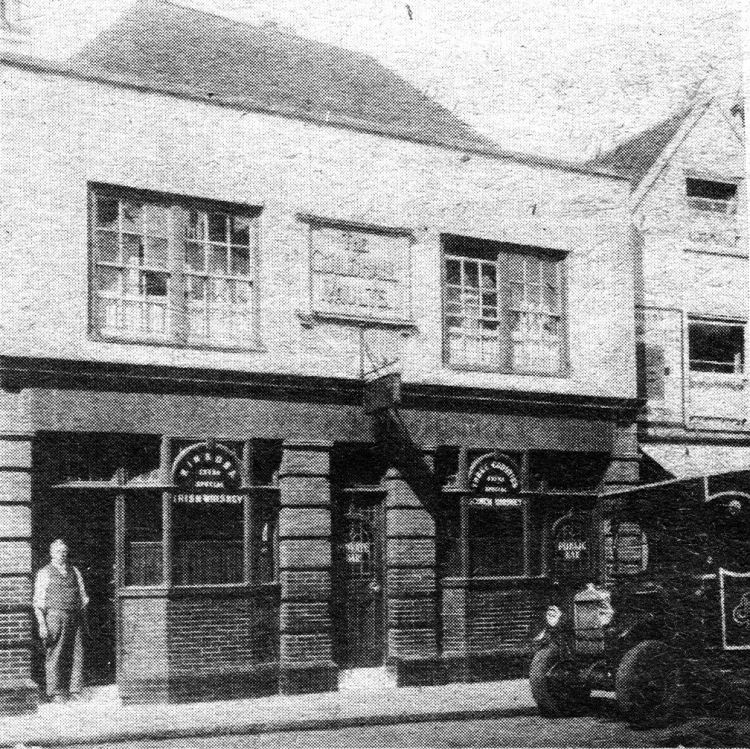 |
|
The picture, above, taken about 1928, shows the
Guildhall Vaults and J. Williams, the tobacconists on the corner of
Bench Street. |
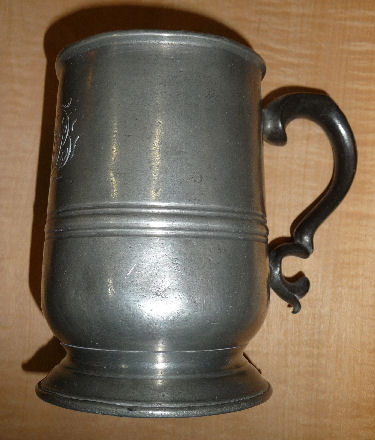 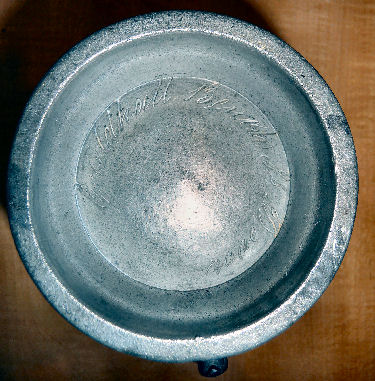
Above pewter mug kindly sent by Pamela and Howard Newman. Inscription
says "Guildhall, Bench Street, Dover." |
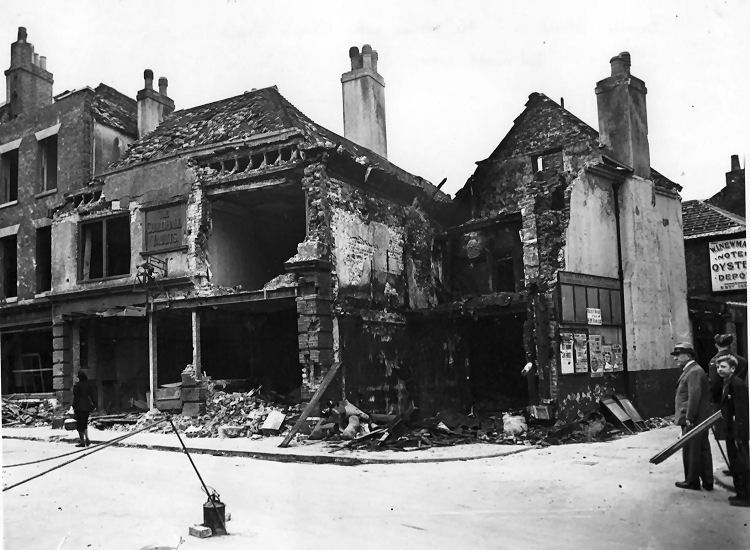 |
|
Bench Street, Guildhall Vaults, corner of Queen Street after being
bombed during WW2. Rubble has been cleared from the "Guildhall
Vaults". The huge crater in Bench Street is just out of our picture to
the left. |
|
From the Dover Express, 21 January, 1833.
DOVER, Jan. 21.
On Wednesday last the friends of Mr. Halcomb held a meeting at the
"Guildhall Tavern," and it being understood that it was for the purpose
of cancelling the feuds and jealousies which existed at the late
election between them and the friends of Sir John Reid, both parties
made a point of attending, and mustered between six and 700, so that it
was impossible to accommodate this vast company in the Catch Club Room;
other rooms in the house were cleared and fitted up with chairs and
tables at the moment, and filled instantly, as were all the passages and
stairs hading to the different rooms.
Such a meeting was never seen before in Dover, but the most perfect good
will and union prevailed, an union which will exist until the ensuing
election, and be sufficient to overturn all the reform or patriotic
unions, as they now call themselves, which may be brought against it by
the brave Captain Stanhope, our ci-devant member, or any of their
reforming friends: by the by the hon. gentleman, Mr. Thomson, paid a
short visit to the town yesterday, in order to dine with my Lord of
Durham, and is off again.
|
|
From the Kent Herald, 6 June 1833
Death
May 28, at Dover, aged 25 years, the wife of Mr. George Foord, of the
"Guildhall Tavern."
|
|
From the Kentish Gazette, 26 September 1865.
Singular Death of a Child.
W. H. Payn, Esq., held a coroner's inquest at the "Guildhall
Inn," on Wednesday evening, on the body of an infant four months
old, the son of John Clayson Archer, an ostler in the employ of Mr.
Francis Packham. Mr. R. Norman was foreman of the jury. Jemima
Archer, mother of the deceased, said at halfpast eleven o’clock the
preceding night she nursed the child when it appeared quite well.
The child then went to sleep, and lay upon her arm between herself
and her husband. At half-past five in the morning she awoke, and
finding the child was cold about, the body she drew the blanket over
it. An hour afterwards, on getting up, she discovered the child was
dead. In answer to the Coroner, witness said she was quite certain
that neither she nor her husband laid upon the child; nor had she
given anything to the child beside the breast.
Mr. J. C. Ottaway, surgeon, said about seven this morning he was
sent for to Archer’s house in Trevanion Street. On an examination of
the deceased he found a good deal of discolouration on the left arm
and left side of the client, the child having evidently been dead
some hours. From the appearance the body presented he formed an
opinion that the child had died in a convulsion, probably brought on
by something having impeded respiration.
The jury found a verdict in accordance with the medical
testimony.
|
|
From the Dover Express and East Kent Intelligencer,
12 April, 1867.
DOVER POLICE COURT
Wednesday: (Before the Mayor, Captain Crookes, R.
Dickeson, W. R. Mowll, and S. M. Latham, Esqs.)
John Sabin, a constable of the Dover Police Force was charged by
David George Austen with being guilty of wilful perjury when a witness
in a case heard on the 1st of April, wherein the complainant and four
others were charged and convicted for wilfully disturbing the
inhabitants of Queen Street.
Mr. Minter appeared for the complainant, and Mr. Lewis for the
defendant.
All the witnesses were ordered out of Court.
After Mr. Minter had detailed the evidence given on the occasion on
question, and denied that Austin was in company with those who committed
the offence of creating a disturbance, he called upon Edward Worsfold
Mowll to prove that the depositions taken on the 1st of April were
correct statements of what was then sworn.
The depositions having been read, David George Austin said: I am an
assistant to my brother who carries on business in Bench Street, Dover.
I remember the 27th of March last. On the evening of that day I went to
the "Guildhall Inn" for the purpose of meeting George Macleod. I saw him
there, and remained there with him about a quarter of an hour, when I
left and proceeded to the "Shakespeare Hotel" to post some letters. When
I came out of the "Shakespeare Hotel" I saw some persons come out of the
"Guildhall Tavern" I did not know who they were, but I distinguished the
voice of George Macloed. The persons who came out of the "Gulilhall"
went up Queen Street. I was stepping from the "Shakespeare Hotel" door.
When I stepped from the "Shakespeare" I hesitated, as I was not certain
whether to go indoors or follow them. I did go after them. When I
arrived at the bottom of Queen Street I did not notice any policeman
there, but I saw some persons going up the street. I could not
distinguish who they were - they were about a third of the way up the
street. I soon afterwards heard a knocking. I was then by the
police-station. I came up to Holmes, Flashman, Bolton, and Macleod as
they were turning to go into Princes Street. Holmes and Flashman were
not companions of mine - to my knowledge I have never before spoken to
them. At the time I left the "Guildhall Tavern" I did not know of the
intention of the other four to go up Queen Street. I will swear I did
not join the four others at the bottom of Queen Street, nor did I stand
with them round Mr. Marks's door or shutters while the knocking took
place. I did not knock at either the door or shutters, and had nothing
to do with the knocking.
By Mr. Lewis: It was about half-past ten when I left the "Guildhall,"
and I hesitated because I was in doubt whether or not to go home. I did
not get home at all that night - it was nearly one o'clock in the
morning when I left the last of the four. Neither Macleod nor the
others, when in the "Gulidhall," said anything to me about where they
were going. I did not know him. I saw no one at the door when I passed
the house where the knocking had been going on - I didn't notice the
door. I did have an umbrella in my hand. After I joined the others, we
all went to Brett's "New Inn" -
Bolton left us after he had been there a short time. Some time after
this, myself and the three others came out of the "New
Inn" together - it was after eleven - and we went down Market Place,
to Corbett's corner. Holmes and myself then went round the backway to
Mr. Macleod's private door, and we afterwards all proceeded down
Snargate Street and went into the "Army and
Navy" public-house. After this we came back again through the Market
Place into Cannon Street. During this time Macleod was talking rather
loudly. When passing up Cannon Street, one of the party rang Mr. Eastes'
bell - I believe it was Flashman. There was then no knocking with
sticks, nor with the knocker. When the bell had been rung, I led George
Macleod across the road. Flashman and myself did not run into the
policeman Pilcher's arms. We did not stop to have the door opened after
the bell was rung. I afterwards was going up Cannon Street, and was
stopped by the policeman Pilcher with one arm. The policeman let go of
my arm to catch Flashman. I then walked away back through the Market
Place. I knew that Flashman and Macleod were taken to the
police-station, but I did not follow them. After they were taken there,
I walked down Queen Street and turned sharp through Last Lane. I was
not, prior to the night in question, on companionable terms with the
others, with the exception of Macleod. On the Friday evening following I
went to the police-station, after I received the summons. I saw a
policeman there - George Macleod went with me for the purpose of getting
the summons heard on the following day. I might have said to Raymond, "I
wish it had occurred somewhere else, and not in this town, where I am
known." Only one of the party were excited that night - George Macleod.
By Mr. Minter: When I went up Cannon Street, I was taking George
Macleod to where he was going to sleep - he was rather tipsy. I had no
knowledge of Flashman's intention to pull the bell. The policeman took
hold of me by the arm and said, "What did you ring the bell for?" I
replied that I did not ring it.
Joseph Edwin Bolton sworn: I am an architect, living in Dover. I was
at the "Guildhall Tavern" on the night of the 27th March, and when I
left there in the company on Holmes, Flashman, and Macleod, Austin was
standing at the bar. I went into the "Guildhall" about half-past nine,
and stayed till about a quarter or ten minutes to ten. I left to go home
to get something to eat, and returned to the "Guildhall" about ten
minutes after ten. I believe Holmes and Flashman were in the "Guildhall"
when I returned. When Holmes, Flashman, Macleod, and myself left there
to go up Queen Street, Austin was not with us. Macleod knocked at Mr.
Marks's shutters and door with his stick as we went up the street, but
Austin was not with us. The next time I saw Austin after we left the
"Guildhall" was when we had turned the corner to go into Princes Street.
By Mr. Lewis: We walked quickly up Queen Street. Austin could not
have been with the party a minute or two before I noticed him. We
planned at the "Guildhall" to go to the "New
Inn," and Austin might have heard us say we were going there. I
won't swear that Austin was in the bar when we left.
Bt the Bench: At the "Guildhall" we were speaking generally to the
people in the bar. I believe Austin was in the "Guildhall" when I went
there the second time, but I can't say he was there when we left to go
up Queen Street. I am sure Austin joined us at the top of Queen Street,
because he hit Holmes on the shoulder, and Holmes said to him, "What!
You here again?" When we came out of the "Guildhall Tavern," I believe
Austin remained in there, but I won't swear he did. He was standing
beside me at the bar a little after ten, and I spoke to him. I got home
that night at a quarter-past eleven - I parted company with the others
at the "New Inn."
William Holmes deposed: I was at the "Guildhall" on the 27th March,
and saw a number of people in the bar. I did not see Austin there when I
went in - I believe he came in afterwards. I heard him speak to Macleod.
I left the "Guildhall" in company with Bolton, Flashman, and Macleod -
Austin was not with us. Previous to that night, I was not acquainted
with Austin. Just before we left the "Guildhall" I heard Austin say he
was going to post some letters. We went up Queen Street after we left
there, but Austin did not go with us. There was knocking when we got to
Marks's house - Macleod, who was walking inside, knocked at the
door and shutters. Austin was not with us at the knocking - he joined us
as we were rounding the corner at the top of Queen Street.
By Mr. Lewis: I remember Austin joined us at the top of the street
because he "tapped" me on the shoulder. I went to the "Guildhall" at
about five or ten minutes past ten - Austin came in after that. We
planned to go to the "New Inn,"
but it was just after Austin had left. I am sure Austin did not join us
till at the top of Queen Street, because just before we reached there I
looked round to see if a policeman were about - I had seen one when we
were at the bottom of the street. When I looked round I could see down
the street as far as the police station, but I could not see Austin. I
was in Cannon Street at a subsequent hour the same night when Flashman
rang Eastes' bell - before he did so he said, "Let's ring the Doctor." I
was not taken in charge. I have never offered Sabin any money in the way
of a bribe, I might have offered him money one night in July or August
last - I was "screwed," and he helped me home. He would not take the
money.
By the Court: When I looked round from the top of the street, just
before the tapping on my shoulder, I did not see anyone between myself
and the police station. I only looked on one side of the street - the
police-station side. Austin left to post the letters about two minutes
before we left the "Guildhall." When Austin came up with us at the top
of Queen Street, he was out of breath as though he had been running.
Shippery Flashman deposed: A proposition was made by Holmes to go to
the "New Inn" after Austin had
left the "Guildhall." Austin did not join us at the bottom of Queen
Street, and was not with us when we had got about 20 yards round the
corner.
By Mr. Lewis: I rand Eastes' bell at a later hour the same night, and
myself and Macleod were taken to the police-station. Sabin then said
that five persons, including ourselves, had gone up Queen Street at a
previous hour, making a disturbance. I did not say anything before I
rang the bell at Eastes.
By the Court: I saw Austin about a dozen or fifteen yards behind,
before we turned the corner of Queen Street, running to catch us up.
When at the "New Inn" I told Austin I was surprised that he had had to
run to catch us up. I did not think he was so far behind. When I looked
back from the top of Queen Street and saw Austin, he was between Marks's
and where we were.
This was the case for the prosecution.
Mr. Lewis then opened the case for the defence, and laid before the
Bench that it was not for them to decide whether Sabin had made a
mistake, and believed that Austin had joined the others in Queen Street
earlier than he did, but from the charge that was made they had to
decide whether or not the defendant had designedly and maliciously
committed perjury. He criticised the evidence, and pointed out the
several discrepancies that occurred in it, and afterward called William
Corrie, a borough policeman, who said: On Wednesday, March 27th, I was
on duty in Last Lane, about twenty minutes to eleven. I saw four
persons, Macleod, Holmes, Bolton, and Flashman, going up Queen Street,
past Market Lane. I saw them distinctly, as I was near a lamp that
projects from the corner of the wall. Directly afterwards I saw Austin
follow them - he was running. I was standing in Barton's doorway, about
two paces from the corner of Queen Street, and he overtook them near the
stores of Messrs. Dickeson and Shuttleworth. After Austin passed, I came
to the corner of Queen Street to watch, and I saw him join the others at
the store. I saw police-constable Sabin following them up. After this my
attention was called to something on my own beat. I know Austin well -
see him nearly every night - and have not the slightest doubt about his
being the person who joined the four near Mr. Dickeson's store.
This witness was cross-examined by Mr. Minter, but no fresh point was
elicited, not his evidence shaken.
The Mayor then intimated that the Bench wished to retire.
After a few minutes absence, the magistrates returned, and the Mayor
said the Bench considered the evidence for the prosecution insufficient
to substantiate the charge.
The case was therefore dismissed.
|
|
From the Dover Express and East Kent Intelligencer,
28 September, 1877. Price 1d.
A CHILD DROWNED
An inquest was held at the "Guildhall Inn," on Monday afternoon,
before W. H. Payn, Esq., Coroner, and a Jury of which Mr. Cullen Marsh
was the foreman, on the body of a child named George Charles Prince, who
fell into the Wellington Dock and was drowned on Sunday afternoon. The
following evidence was called:-
Charles Prince, father of the child, said he last saw the
deceased on Sunday afternoon at half-past four. He was four years of
age.
Mr. James John Coverdale, a wine merchant, a visitor at Dover, said:
When I was passing the Racquet Court yesterday afternoon I heard a
splash in the Water in the Wellington Dock. I saw two children running
away. I went to the side of the quay and saw a child in the water. I got
on a vessel on the quay-side but found nothing with which I could
save the child, and I was not a swimmer. While I was searching for
assistance the child turned on his back and sank. I think there should
be something put around this dock to fence it off, there being no
protection.
Francis Oscar Johnson said: I am mate of the Swedish brig Emily,
lying at the ballast quay. yesterday afternoon I was told that there was
a child in the water. Some women pointed out the spot where the child
sank. I grappled with a boat-hook in the direction pointed out and found
the body under the keep of another vessel. I recovered the body
and took it to the Police-station.
Mr. Edwin Duke, surgeon, stated that he was returning from the Pier,
when he saw a number of people looking into the Wellington Dock, and on
enquiry he found a child had fallen into the water, and they were
grappling for it. I waited till they recovered the body, when I examined
it and found it quite dead.
A verdict of accidental death was returned.
|
|
From the Dover Express19 August 1888
FIRE AT THE GUILDHALL VAULTS
On Sunday afternoon considerable excitement was ensued in Bench street
by an outbreak of fire at the "Guildhall Vaults Inn." The fire was
discovered at twenty minutes past four by Mr. Comes, fly proprietor, who
was driving past the house and noticed smoke issuing from the roof, he
immediately ran to the Queen-street Fire-station, where he gave the
alarm. Station Sergeant Barton telephoned to Superintendent Sanders, at
the Town Hall, and then had the hose-reel at Queen-street at once got
out. The occupants of the "Guildhall Vaults" were out driving at the time,
and Sergeant Barton had to burst open the door before an entrance could
be effected. The house was full of smoke, which proceeded from the
direction of the kitchen at the rear. It was found that the fire had
broken out in cupboard between the kitchen and the staircase, the origin
being supposed to be over heating of some lucifer matches, which were
kept there. Superintendent Sanders quickly arrived with Sergeant Nash
and Several members of the Brigade, who at once set to work, stand-pipes
being fixed in Bench-street and Queen-street. The fire had got a good
hold on the premises, and it was at one time thought that the whole
building would be destroyed, the walls of the top rooms becoming very
much heated. The brigade worked with a will, and are to be complimented
on the way in which they succeeded in coping with the flames. The supply
of water was good and the fire was extinguished about an hour after its
being first discovered. The damage was of an extensive character. The
kitchen was entirely gutted and its contents destroyed. The staircase
was very much burnt and the passage scorched. Considerable damage was
also done to furniture &c., by smoke, heat, and water. The premises were
insured in the Guardian Fire Office and the furniture in the Norwich
Union. The owner of the house is Mr. E. Lukey and the occupier Mrs. K
Ayers. |
|
From the Dover Express, 19 August 1888
FIRE AT THE GUILDHALL VAULTS
On Sunday afternoon considerable excitement was ensued in Bench street
by an outbreak of fire at the Guildhall Vaults Inn. The fire was
discovered at twenty minutes past four by Mr. Comes, fly proprietor, who
was driving past the house and noticed smoke issuing from the roof, he
immediately ran to the Queen-street Fire-station, where he gave the
alarm. Station Sergeant Barton telephoned to Superintendent Sanders, at
the Town Hall, and then had the hose-reel at Queen-street at once got
out. The occupants of the Guildhall Vaults were out driving at the time,
and Sergeant Barton had to burst open the door before an entrance could
be effected. The house was full of smoke, which proceeded from the
direction of the kitchen at the rear. It was found that the fire had
broken out in cupboard between the kitchen and the staircase, the origin
being supposed to be over heating of some lucifer matches, which were
kept there. Superintendent Sanders quickly arrived with Sergeant Nash
and Several members of the Brigade, who at once set to work, stand-pipes
being fixed in Bench-street and Queen-street. The fire had got a good
hold on the premises, and it was at one time thought that the whole
building would be destroyed, the walls of the top rooms becoming very
much heated. The brigade worked with a will, and are to be complimented
on the way in which they succeeded in coping with the flames. The supply
of water was good and the fire was extinguished about an hour after its
being first discovered. The damage was of an extensive character. The
kitchen was entirely gutted and its contents destroyed. The staircase
was very much burnt and the passage scorched. Considerable damage was
also done to furniture &c., by smoke, heat, and water. The premises were
insured in the Guardian Fire Office and the furniture in the Norwich
Union. The owner of the house is Mr. E. Lukey and the occupier Mrs. K
Ayers.
|
|
From the Dover Express and East Kent News, Friday, 10 July, 1891. Price 1d.
ACCIDENT
A man named Thomas Maroney, of Castle Place, was taken to the Hospital
on Wednesday evening, suffering from a broken leg, which he sustained by
slipping down in the “Guildhall” public-house, Bench Street, whilst
carrying some beach on his back.
|
|
Dover Express. 1 September 1899.
Fruits of the Traffic.
Jonas Saw was brought up charged with using bad language in King Street.
Sergeant Ruben Danson said that about noon on Monday he was called to
the "Guildhall," and Mr. Ward, landlord, said the prisoner had been very
abusive, and using bad language. He refused to leave the house and
witness put him out. He refused to go away, and used very obscene
language. In consequence witness took him into custody. There was
another man complained of, but he went away.
Mr. Ward, the landlord, said that one of Messrs. Pearson's gangers name
Smith brought four men in and called for a quart between them. Smith and
two of the men left, and the other two became noisy and he had to call
the police in to put them out.
The other man left.
Prisoner was fined 5s.
Mr. Bradley commended Mr. Ward for refusing to serve the men, who had
evidently had too much, and he hoped other publicans would do the same.
|
|
From the Dover Express and East Kent News, Friday, 6 February, 1914. Price 1d.
DOVER LICENSING SESSIONS GUILDHALL LICENCE
The plans of the “Guildhall,” Bench Street, were produced by Mr. F.
Hayward. It was stated that the plans had been altered in accordance
with the desires of the Bench.
They were approved.
|
|
From the Dover Express and East Kent News, Friday, 20 March
1942.
At the Dover Licensing Sessions on Monday, a Proection Order was
granted in respect of the "Guildhall Vaults," and the licence
transferred from Mrs. Morecroft to Freda May Appleby.
|
|
Dover Express 21st August 1942.
At the Dover Police Court on Friday last, plans for alteration of
“Guildhall Vaults” to provide better supervision were approved. A music
and singing licence was also granted.
|
|
From the East Kent Messenger. December 2nd 1955.
First, oil bomb hit
the old "Guildhall Vaults"
THE first oil bomb to fall on Dover landed right in the middle of Bench
Street during the early hours of October 6th, 1943. 'The deadly fuel it
contained set fire to the historic Guildhall Vaults and adjoining
tobacconist's shop and a shoe shop opposite.
All three premises were completely gutted and German communiques
mentioned large fires in the Dover area.
The Guildhall Vaults was one of the oldest public houses in Dover, being
founded in 1690. It is reputed to have stood upon the site of the Dover
Guildhall, where the Assizes were held.
A secret passage from the Guildhall Vaults to the Western Heights is
said to be used for moving prisoners.
The Vaults was a popular rendezvous for seafaring men. Trinity House
pilots in particular. It was known all over the world.
Older readers will no doubt recall the famous grapevine in the back
garden. This survived enemy action but unfortunately it succumbed to the
demolition men.
Next door to the Vaults and part of the building was Mr. Jack Williams'
tobacconist's shop. He lost every bit of his stock that night, but by
telephoning and sending telegrams, Mr. Williams had cigarettes delivered
to him the next day and was completely restocked within 48 hours.
For Dover's wartime inhabitants were not to be done out of their
cigarette and Mr. Williams continued at another shop in Biggin street.
Today, the original site is still empty. There Is a well-kept lawn,
surrounded by ugly gaping walls.
But one day, the Guildhall Vaults will rise again. For planning
permission has been granted to the brewers. (Dec 10th 1955).
|
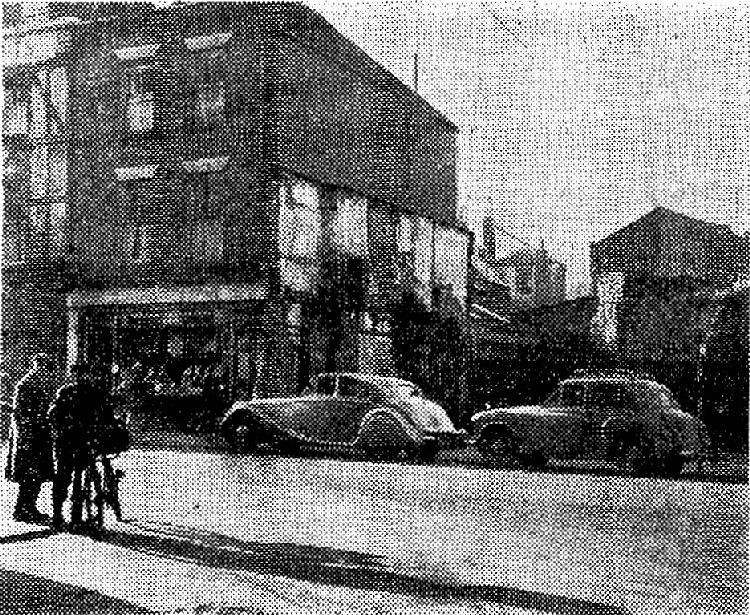 |
|
NO RE-BUILDING HAS TAKEN PLACE YET (circa 1956):- There is a well-kept lawn behind a
tiny privet hedge. A new public house will be erected on the site.
This was later shown to be the "Dover Tavern"
and opened on 4th July 1957. |
Reckoned to be a pretty old one this. John Bachelor, the mayor of 1600,
was the keeper of a "Guildhall Tavern" near the Market Place and this it was
said, could be traced to 1690. Previous to that it had been titled the "Bull" with a large assembly room at the back for meetings and concerts. A
passage, used for the movement of French prisoners, ran from here to the
Western Heights.
However, further research has turned up the following, as seen in the
Kent Post of 1732, so it looks as if the "Guildhall Tavern" either didn't
exist till after that date, or the "Bull"
was indeed another pub nearby. Also the Trade Directory of 1798 definitely
gives a "Bull" in Market Place. Earliest licensee traced so far is as late
as 1826.
|
From the Kentish Post, March 1-4, 1732
To be Lett, "The Bull Alehouse" near the Market Place, in Dover, now
occupied by Nicholas Ellenden.
|
|
From the Dover Telegraph, 5 December, 1835. p.8 col.4
Mr. T Houghton Senior, died 28 November at Dover - late baker and
formerly landlord of the "Guildhall Tavern"
|
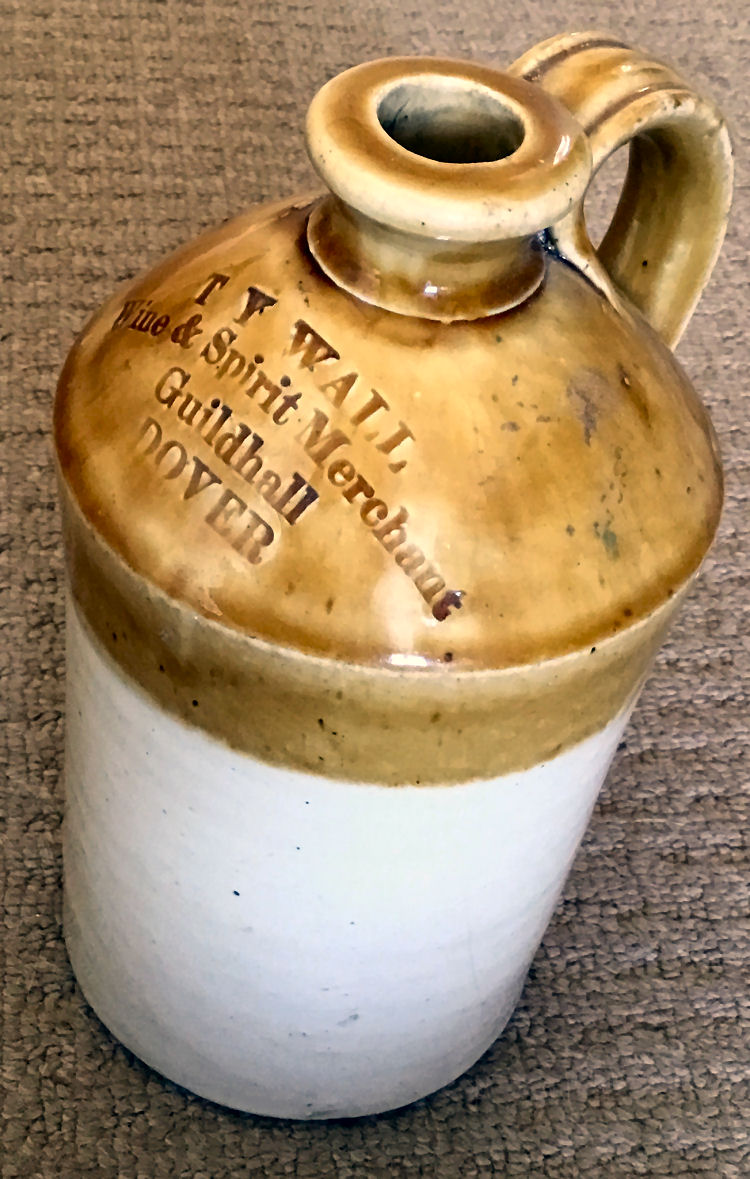
Above flagon, circa 1857, kindly sent by Ken Chapman. |
It belonged to Walker when it was sold for £1,300 in 1859. The title
"Guildhall Vaults" was certainly in use from 1805. It was extensively
damaged by fire on 13 May 1888.
It closed in March 1942, the property then of Ind Coope and Allsopp.
Another victim of world war two, it was damaged when an oil bomb landed in
Bench Street on 6 October 1943 setting fire to it.
The Queen Street corner property, during the 19th century, was a
saddler's, and next was the "Guildhall Vaults" Inn, which had historic
connections, although not definitely known, with the old Guildhall, which
existed before the one in the Market Place was built in 1607.
The "Dover Tavern" has since been erected on the site for Ind Coope.
LICENSEE LIST
BOND William 1826-28+

HOUGHTON Thomas 1828
 (Guildhall Tavern)
(Guildhall Tavern)
FOORD George 1832-47+
   
WALL Thomas Young 1857
BIRD George Herbert 1871-82+ (also wine & spirit merchant age 47 in 1881 ) )
 
HILLS Johnathan 1888-91+

POFFLEY Frewin 1893-38 end (Late Sergeant Major, Royal Artillery)
WARD James 1898-June/1912
(age 62 in 1901 ) )
   
WHITING Walter June/1912-13+
 
TOWNSEND John Robert 1914-Jan/38
   
MORECROFT Neville Jan/1938-Dec/39
 
MORECROFT Mrs Dec/1939-Mar/42
 (wife) (wife)
APPLETON Miss Freda May Mar/1942-43 end

 From the Pigot's Directory 1828-9 From the Pigot's Directory 1828-9
 From the Pigot's Directory 1832-33-34 From the Pigot's Directory 1832-33-34
 From the Pigot's Directory 1839 From the Pigot's Directory 1839
 From the Pigot's Directory 1840 From the Pigot's Directory 1840
 From Bagshaw Directory 1847 From Bagshaw Directory 1847
 From the Post Office Directory 1874 From the Post Office Directory 1874
 From the Post Office Directory 1882 From the Post Office Directory 1882
 From the Kelly's Directory 1899 From the Kelly's Directory 1899
 From the Post Office Directory 1903 From the Post Office Directory 1903
 From the Kelly's Directory 1903 From the Kelly's Directory 1903
 From the Post Office Directory 1913 From the Post Office Directory 1913
 From the Post Office Directory 1922 From the Post Office Directory 1922
 From Pikes Dover Blue Book 1924 From Pikes Dover Blue Book 1924
 From Pikes Dover Blue Book 1932-33 From Pikes Dover Blue Book 1932-33
 From Pikes Dover Blue Book 1938-39 From Pikes Dover Blue Book 1938-39
 From the Dover Express From the Dover Express
 Census Census
|







